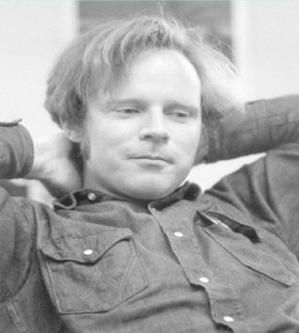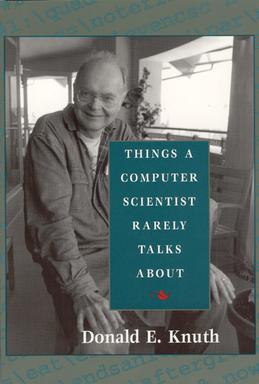Related Research Articles

In mathematics and computer science, an algorithm is a finite sequence of rigorous instructions, typically used to solve a class of specific problems or to perform a computation. Algorithms are used as specifications for performing calculations and data processing. More advanced algorithms can use conditionals to divert the code execution through various routes and deduce valid inferences, achieving automation eventually. Using human characteristics as descriptors of machines in metaphorical ways was already practiced by Alan Turing with terms such as "memory", "search" and "stimulus".

Computer science is the study of computation, information, and automation. Computer science spans theoretical disciplines to applied disciplines. Though more often considered an academic discipline, computer science is closely related to computer programming.

Donald Ervin Knuth is an American computer scientist, mathematician, and professor emeritus at Stanford University. He is the 1974 recipient of the ACM Turing Award, informally considered the Nobel Prize of computer science. Knuth has been called the "father of the analysis of algorithms".
TeX, stylized within the system as TeX, is a typesetting system which was designed and written by computer scientist and Stanford University professor Donald Knuth and first released in 1978. TeX is a popular means of typesetting complex mathematical formulae; it has been noted as one of the most sophisticated digital typographical systems.

The Art of Computer Programming (TAOCP) is a comprehensive monograph written by the computer scientist Donald Knuth presenting programming algorithms and their analysis. Volumes 1–5 are intended to represent the central core of computer programming for sequential machines.

Robert Endre Tarjan is an American computer scientist and mathematician. He is the discoverer of several graph algorithms, including Tarjan's strongly connected components algorithm, and co-inventor of both splay trees and Fibonacci heaps. Tarjan is currently the James S. McDonnell Distinguished University Professor of Computer Science at Princeton University.

Robert Sedgewick is an American computer scientist. He is the founding chair and the William O. Baker Professor in Computer Science at Princeton University and was a member of the board of directors of Adobe Systems (1990–2016). He previously served on the faculty at Brown University and has held visiting research positions at Xerox PARC, Institute for Defense Analyses, and INRIA. His research expertise is in algorithm science, data structures, and analytic combinatorics. He is also active in developing the college curriculum in computer science and in harnessing technology to make that curriculum available to anyone seeking the opportunity to learn from it.

Robert W Floyd was a computer scientist. His contributions include the design of the Floyd–Warshall algorithm, which efficiently finds all shortest paths in a graph and his work on parsing; Floyd's cycle-finding algorithm for detecting cycles in a sequence was attributed to him as well. In one isolated paper he introduced the important concept of error diffusion for rendering images, also called Floyd–Steinberg dithering. He pioneered in the field of program verification using logical assertions with the 1967 paper Assigning Meanings to Programs. This was a contribution to what later became Hoare logic. Floyd received the Turing Award in 1978.
The TPK algorithm is a simple program introduced by Donald Knuth and Luis Trabb Pardo to illustrate the evolution of computer programming languages. In their 1977 work "The Early Development of Programming Languages", Trabb Pardo and Knuth introduced a small program that involved arrays, indexing, mathematical functions, subroutines, I/O, conditionals and iteration. They then wrote implementations of the algorithm in several early programming languages to show how such concepts were expressed.

Knuth reward checks are checks or check-like certificates awarded by computer scientist Donald Knuth for finding technical, typographical, or historical errors, or making substantial suggestions for his publications. The MIT Technology Review describes the checks as "among computerdom's most prized trophies".

Barbara Liskov is an American computer scientist who has made pioneering contributions to programming languages and distributed computing. Her notable work includes the development of the Liskov substitution principle which describes the fundamental nature of data abstraction, and is used in type theory and in object-oriented programming. Her work was recognized with the 2008 Turing Award, the highest distinction in computer science.
Jeffrey David Ullman is an American computer scientist and the Stanford W. Ascherman Professor of Engineering, Emeritus, at Stanford University. His textbooks on compilers, theory of computation, data structures, and databases are regarded as standards in their fields. He and his long-time collaborator Alfred Aho are the recipients of the 2020 Turing Award, generally recognized as the highest distinction in computer science.
Line breaking, also known as word wrapping, is breaking a section of text into lines so that it will fit into the available width of a page, window or other display area. In text display, line wrap is continuing on a new line when a line is full, so that each line fits into the viewable window, allowing text to be read from top to bottom without any horizontal scrolling. Word wrap is the additional feature of most text editors, word processors, and web browsers, of breaking lines between words rather than within words, where possible. Word wrap makes it unnecessary to hard-code newline delimiters within paragraphs, and allows the display of text to adapt flexibly and dynamically to displays of varying sizes.

Alexander L'vovich Brudno was a Russian computer scientist, best known for fully describing the alpha-beta pruning algorithm. From 1991 until his death he lived in Israel.

Things a Computer Scientist Rarely Talks About (2001) is a book by Donald E. Knuth, published by CSLI Publications of Stanford, California. The book contains the annotated transcripts of six public lectures given by Donald E. Knuth at MIT on the subject of relations between religion and science. Knuth gives credence to the concept of divinity.
Annie Else Zaenen is an adjunct professor of linguistics at Stanford University, California, United States.

Bertrand du Castel is a French-American author and scientist who won in 2005 the Visionary Award from Card Technology Magazine for pioneering the Java Card, which by 2007 had sold more than 3.5 billion units worldwide. In 2008, du Castel and Timothy M. Jurgensen published Computer Theology: Intelligent Design of the World Wide Web, a theology of the World Wide Web based on a comparative study of human societies and computer networks.

Andrzej Kot was a Polish designer, calligrapher, typesetter, typographer, book illustrator.
The Philippe Flajolet Lecture Prize is awarded to for contributions to analytic combinatorics and analysis of algorithms, in the fields of theoretical computer science. This prize is named in memory of Philippe Flajolet.